Notater fra John Pilgers dokumentarfilm “The War You Don’t See”.
Filmen handler om mediernes propagandarolle når det gælder manipulation af befolkningen under krig.

Vigtigt begreb i filmen: Embedded journalism
Embedded journalism [indlejret journalistik] refers to news reporters being attached to military units involved in armed conflicts. The practice has been criticized as being part of a propaganda campaign whereby embedded journalists accompanied the invading forces as cheerleaders and flacks. It first came to be used in the media coverage of the 2003 invasion of Iraq.
Synonymer for embedded: nested, inserted, planted, stuffed in.
I filmen fortæller advokaten Phill Shiner at de grusomme ting som Amerikanere og Britere udførte mod civilbefolkningen under krigen i Irak..”aldrig, aldrig”..vil komme frem gennem “embedded journalists. Det eneste de gør er at være et lydigt talerør for det narrative som krigsmaskinen ønsker skal frem i medierne.
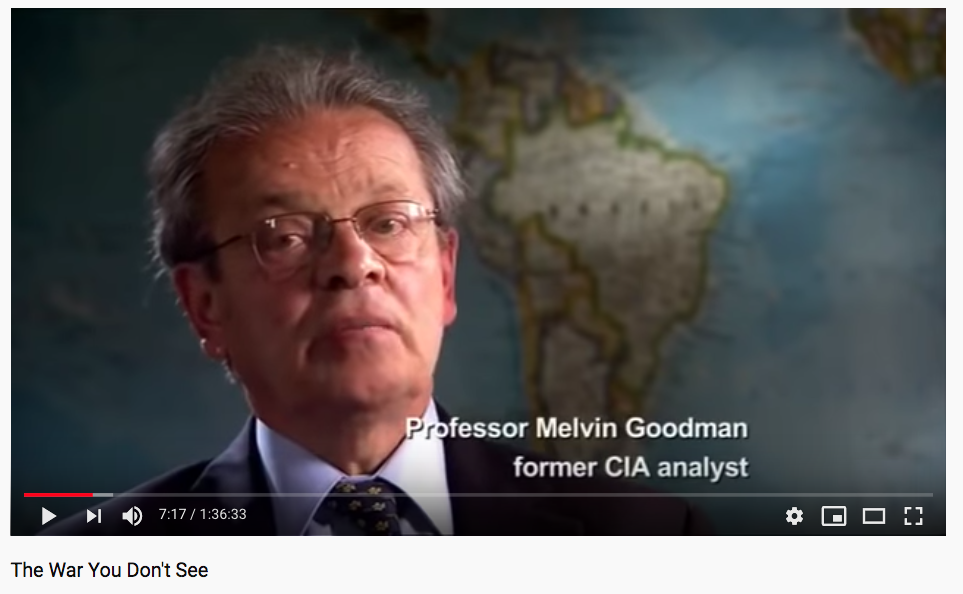
There are Pentagon contracts with the news organisations in terms of how to manipulate the news. There are Pentagon officials involved in press releases that go to the media in which intelligence is used to manipulate public opinion… Then you have retired generals who serve as press spokesmen for all the networks [tv stationer], and it is never revealed which military industrial firms they work for
Profesor Melvin Goodman
It is a total spin and a lie that media in the West is the freest in the world.
Journalister minder mere om stenografer for magthaverne end rapportere der søger sandheden. De går til pressemøder (press briefings), får en udtalelse eller to fra embedsmænd (officials), refererer til “officielle kilder”, som om det skulle være en garanti for sandhed og derefter trykker de det i avisen næste dag. Journalister er mest stenografer og papegøjer!
Mediernes afhængighed af deres kilder
Medierne er afhængige af en god kontakt til deres kilder (officielle kilde, og embedsmænd etc.) Så snart et nyhedsmedier kommer med den mindste kritik af det som disse kilder repræsenterer, så mister nyhedsmediet sin adgang til nyheder. Og sker det på for stor en skala kan avisen, tv-stationen eller hvad det nu er, ikke overleve. For man må aldrig glemme at det at LEVE af nyheder kræver at man har en lang række kilder som man har et godt forhold til. Skal du dække en krig i Irak fx så er dine officielle kilder militære generaler. Hvis du er kritisk overfor invasionen, så lukker kilden med det samme.
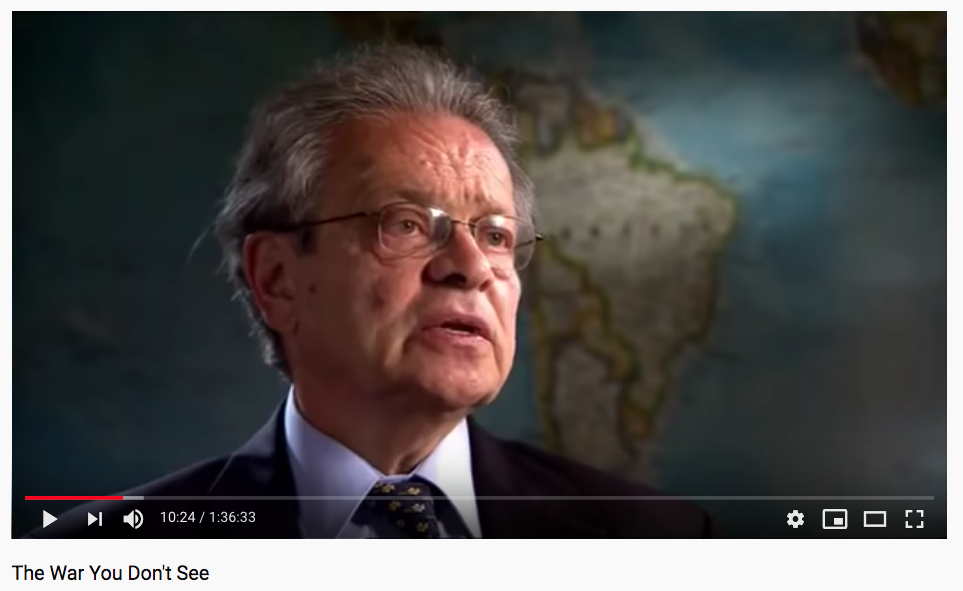
Begreb: Conventional wisdom
Meaning: the body of ideas or explanations generally accepted as true by the public and/or by experts in a field.
24 hour News [BBC World News] in particular is a system that is the most easy to manipulate. 24 hour News is a giant echo chamber. So that is why for example Bazra [the war in Irak] was reported as haven fallen 17 times before it actually fell. And yet, within 24 hour News, when you are reporting it for the 7th time [han mener den 8. gang] in that chain of seventeen times that the city is fallen, the fact that it has been wrong the previous seven times, that doesn’t matter.
Rageh Omaar, BBC world affairs reporter, 2000-2006
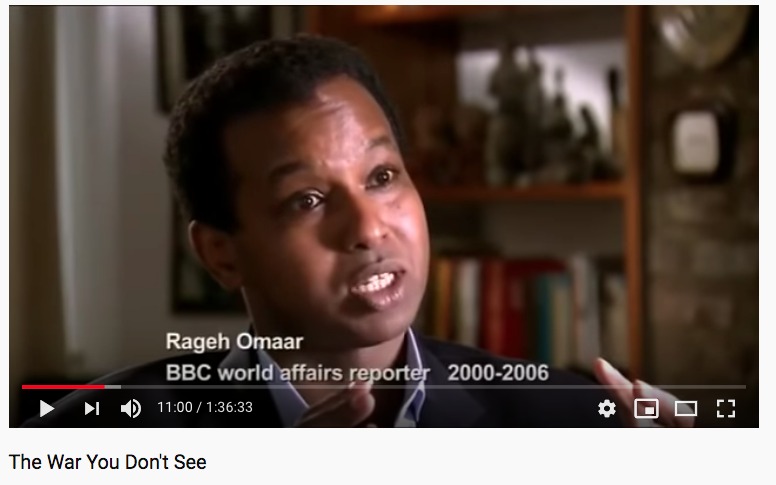
David Rose wrote articles for the newspaper The Observer, about the Iraq connection to 9/11. At that time when he wrote the articles, he believed that it was the truth. Later he found out that he as a journalist had been manipulated to write it.

It is very painfully apparent that the facts that I believed to be true in those articles were not true. They were a pack of lies fed to me by a fairly sophisticated disinformation campaign
David Rose, former Observer journalist
One of the most famous journalists in America, Dan Rather was a news anchor for 24 years on CBS Evening News. In this interview, he admits that fear of being without a job and fear of being ridiculed and called “unamerican” made him say things publically he didn’t believe in.
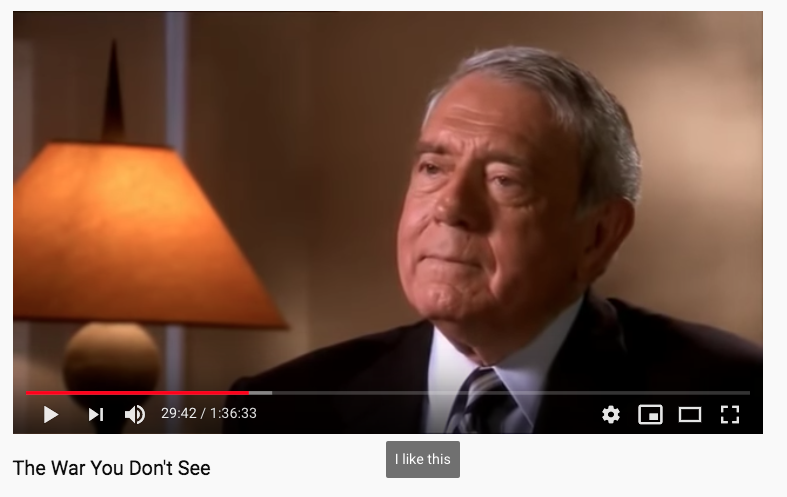
Fear is present in every newsroom in the country. Fear of losing your job. Fear of being stuck with some label – unpatriotic – on you…
Dan Rather, CBS News anchor for 24 years
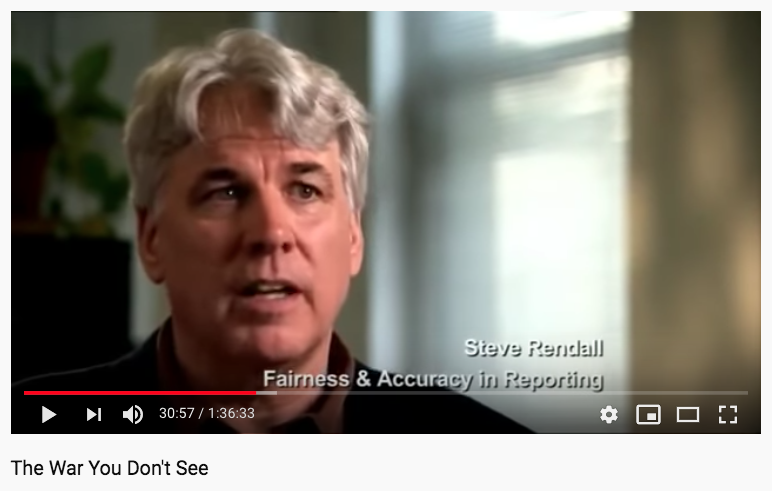
Steve Rendall from “Fairness & Accuracy in Reporting” tells in this interview how the Associated Press reporter Charles Hanley went together with UN weapons inspectors combing through Iraq to find the suspected weapons of mass destruction. But they didn’t find any. Hanley reported it back to the news editors, but his findings never made it into the news. Steve Randall explains:
[the articles of Charles Hanley] made it to every newsroom in the United States – because it is from the AP [Associated Press] – but it got virtually no pick up [was not printed]….It didn’t fit the script [in other words: the narrative which was already chosen to be told to the public as being the truth]
Steve Rendall from “Fairness & Accuracy in Reporting”
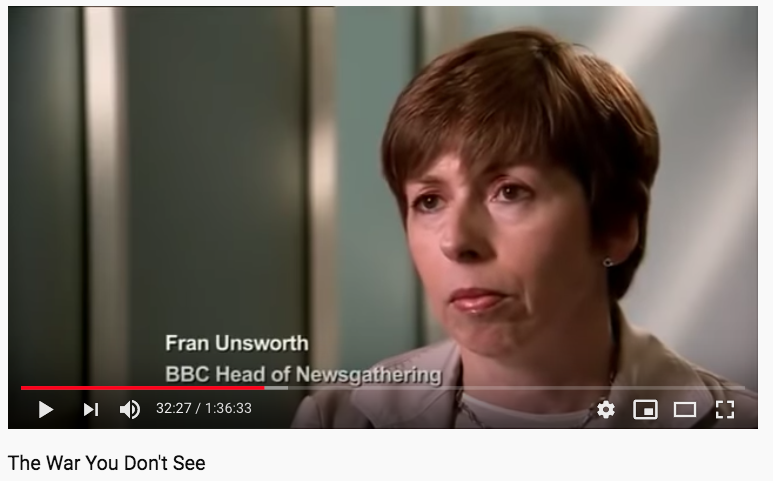
Fran Unsworth who was the head of the newsgathering on BBC up to the war in Iraq answers John Pilgers question “why didn’t the BBC get it?” [figured out that the government claims of weapons of mass destruction in Iraq was a lie]
I think we did not realize until much later in the day that the weapons of mass destruction were not there… I think we didnt get it partly because of lack of access. If you want to find out what is happening then you really need to go there and do some first hand reporting which wasent possible in the run up to the war in Iraq
Fran Unsworth, BBC Head of Newsgathering
But what Fran Unsworth says is not correct. There was actually access to first-hand reports from Iraq.
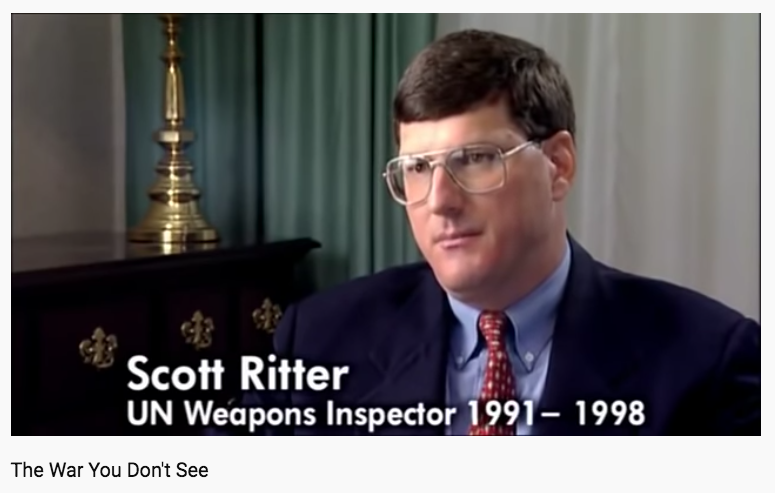
In 1999 [4 years before the invasion of Iraq]
How public memory is distorted and manipulated by Hollywood to create a false narrative of the US brutal invasions all over the world
We love novels and movies which claim to be “build on a true story”.That could be the case but at the same time could also be the biggest lie. Keep in mind that the most effective lies are the ones that seem to be closest to the truth. If you want to fool someone with a counterfeit dollar bill you have to be very good to plagiarize the real one very closely. Or else everyone will easily see the forgery. The same thing accounts for Hollywood movies “build on a true story”. One example is the movies that were made in the aftermath of the Vietnam War: The Deer Hunter, Platoon, Good Morning Vietnam, and The Green Berets, are just a few examples. These films were not the truth turned into fiction. They were fiction turned into truth. As John Pilger puts it: They were “the invader’s victory purged of all crime”.
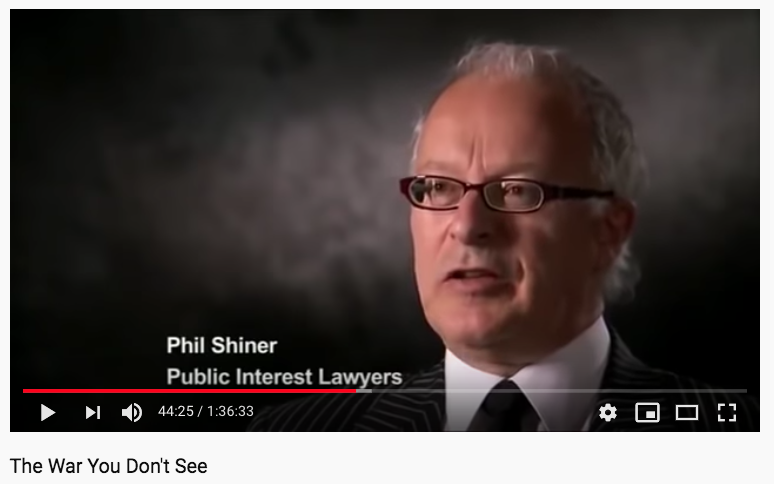
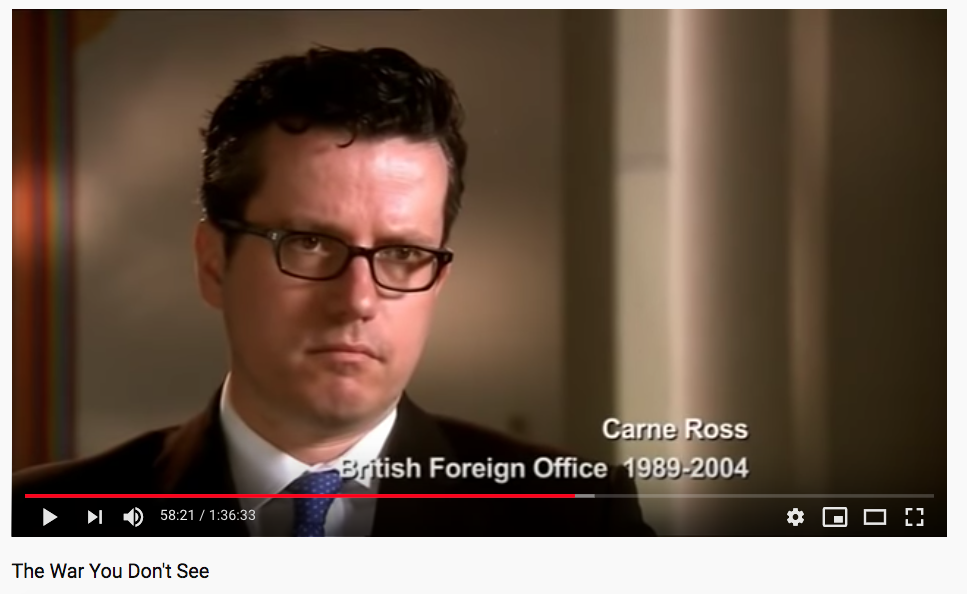
Carne Ross, British Foreign Office (1989-2004). He worked at the UN from 1997-2002 as a UK delegation’s expert on the Middle East.
Carne explains the situation in Iraq during the invasion and later during the sanctions:
Carne: we had extrordinarly good sources to put together our [the UN, UK and US] to find little facts to justify their story-factoids*…
Pilger asks: And how eagerly would the journalists accept these factoids*?
Carne: They had very little chance to do anything other than accept our version of events, more or less relay [videregive] it un-edited to the public. Government is an information-machine, and we would control access for journalists to us, to governments. When I was in news department in the foreign office we would control access to the foreign secrety as a form of reward to journalists. If they were critical, if we felt they were too hostile to our account of events we would not give them the good …?…trips with the foreign secretary around the world or exclusive interviews every now and then. We did the same in New York. If journalists were not particularly supportive to our account we would freeze them out. We would life harder for them…(…)…Surtain journalists are rewarded with access for being supportive of the story. They [diplomates like Carne?] will basically tell them: “If you carry on with that line, that kind of unjustified criticism of our government policy on x, y or z, we will punish you”. And that is very explicit those kinds of threats….What happened was not an intelligence-based process. It was basically a PR process run by number 10 to produce a document that was much more politically credible than the evidence suggested.
Pilger asks: It was a major deception, wasn´t it?
Carne: I think it amounts to the effect of that.
Begreb: *factoid
FACTOID, Meaning of the word: A factoid is either a false statement presented as a fact,[1][2]or a true but brief or trivial item of news or information. An invented fact believed to be true because it appears in print.An item of unreliable information that is repeated so often that it becomes accepted as fact.
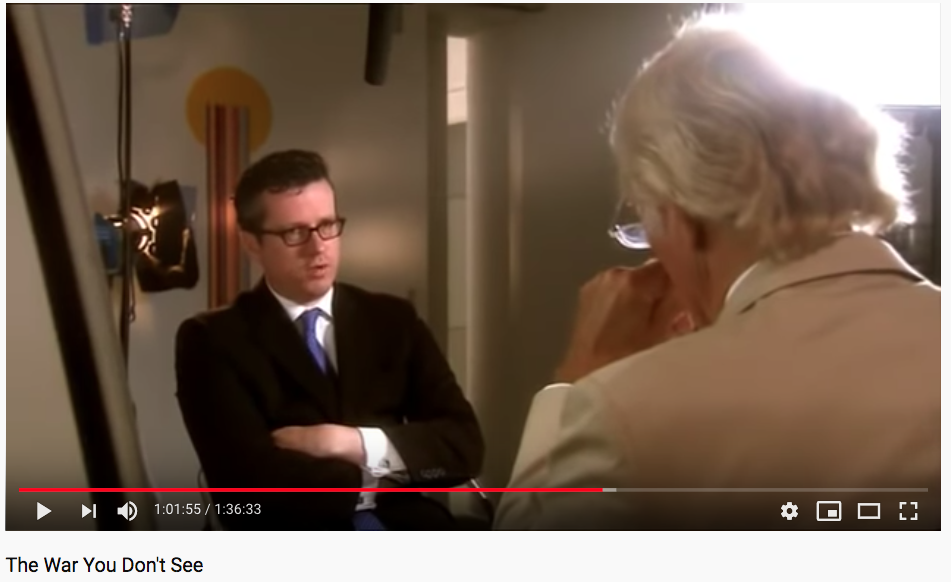
LINKS
John Pilger foredrag om medierne: War by media and the triumph of propaganda
